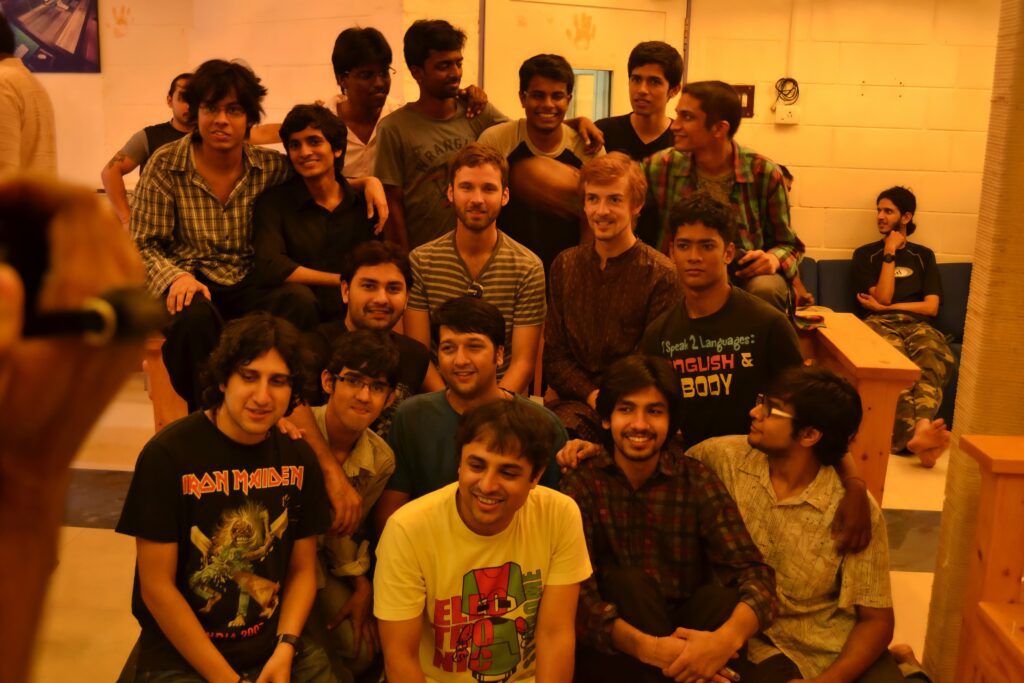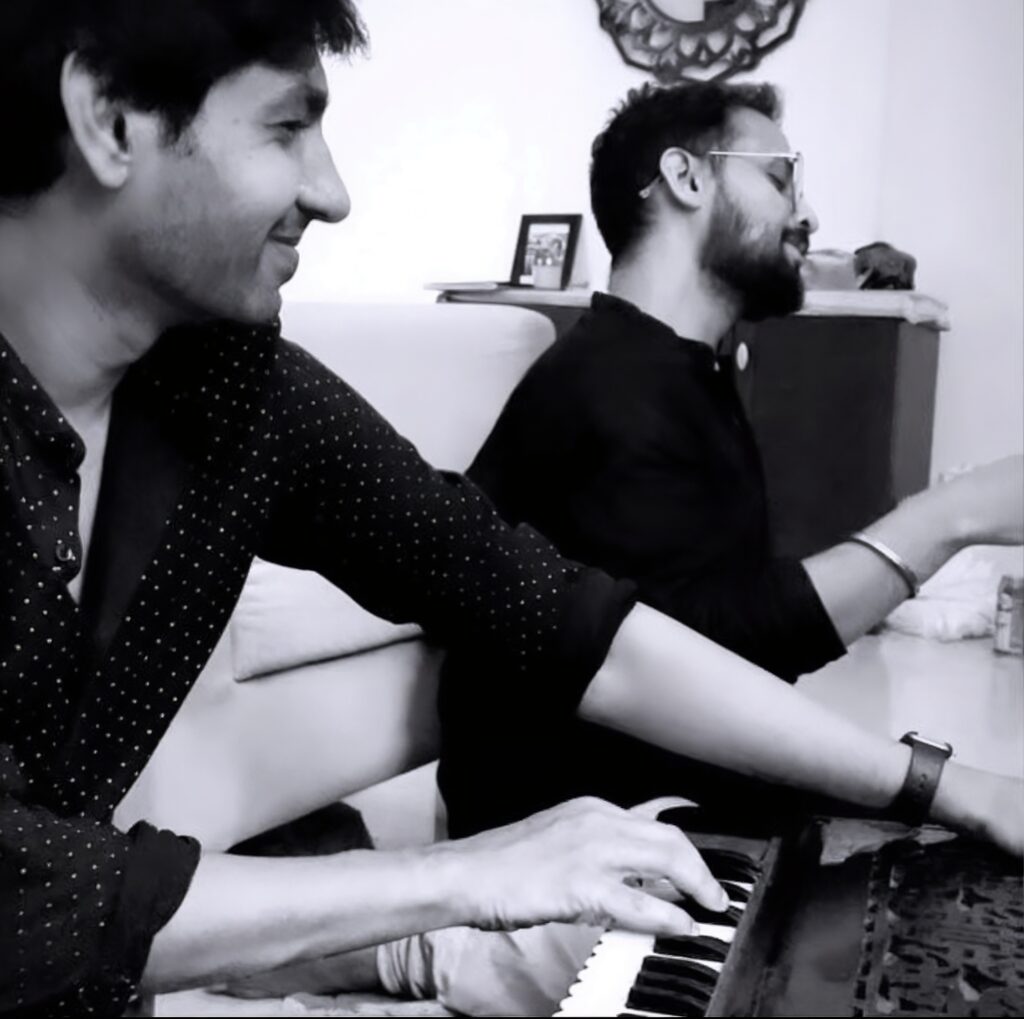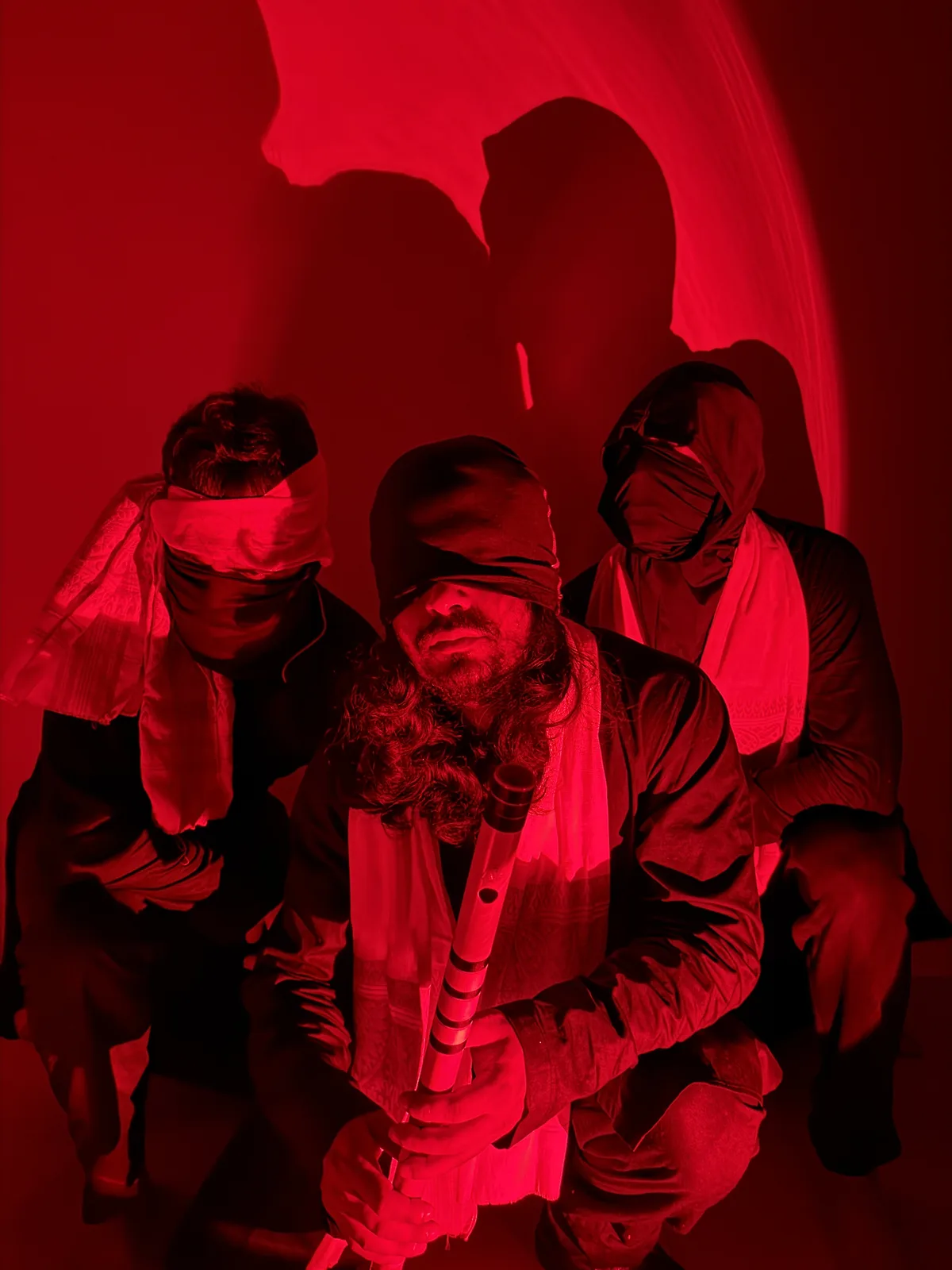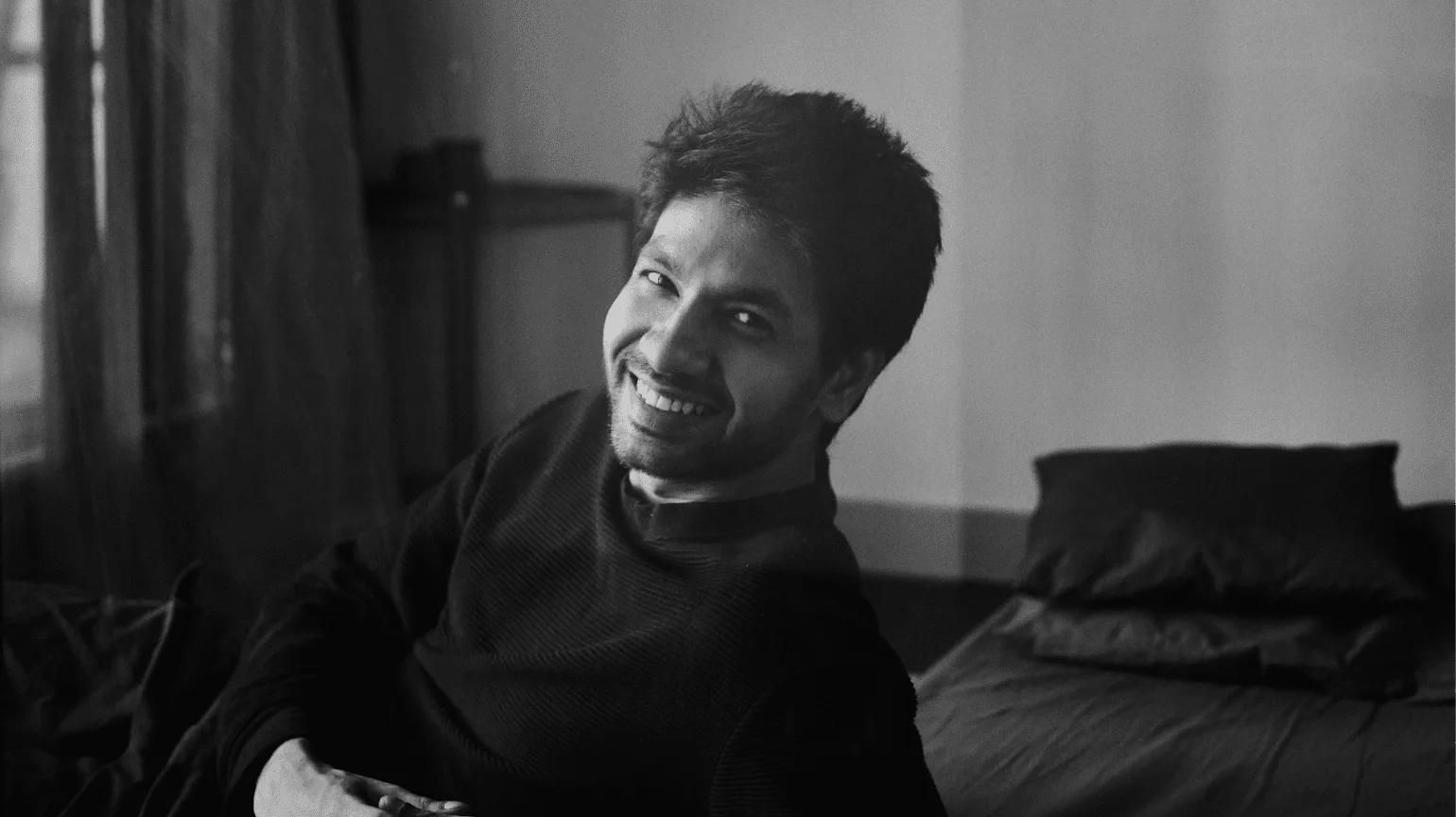During a piano lesson, my Western Classical teacher introduced me to a song that would leave a profound mark on my playlist. ‘Khaare Khaare’ by Siddharth Pandit, he proudly shared. By the time the piano interlude had begun, I was already in awe of its beauty and depth.
Siddharth Pandit, aka Panditjee, is a Mumbai-based music composer and producer from Uttar Pradesh who’s carved a niche for himself with his body of work, both in the independent and film genres. An alumnus of AR Rahman’s KM College Of Music and Technology, Chennai, his independent project ‘Azaad Sangeet’ is a love-letter to his musical sensibilities, as he puts it- ‘Organic Homemade Indian Independent Music’. Siddharthʼs music flows ethereally as if there were no rules, tastefully fusing all kinds of genres and styles with Indian music at its heart. It talks to you through the most specific, personal, thought-provoking and sublime emotions. In fact, it demands that you talk back to it.
With Azaad Sangeet Season 3 just around the corner, I got a chance to interview the man behind the music and try to understand his musical world a little better.
1. Would you briefly narrate the story of how you began with music? Any memories of a first demo/recording that you felt excited about?
I didn’t come from a musical family, but my journey with music began when I was just 5 years old. My Mama gifted me a small Casio SA-5 keyboard, and I immediately fell in love with exploring the sounds I heard around me. Over the years I taught myself how to play using various resources. I recall using an Intex headphone with a built-in mic to capture sound by placing it near the keyboard speaker. I recorded the arrangements I sequenced on the keyboard and sang into the mic simultaneously. These recordings were saved using Windowsʼ built-in audio recorder and a free software called WavePad. Growing up in the remote districts of Uttar Pradesh, we had limited resources and exposure to even the smaller towns and cities. Despite these challenges, my parents were incredibly supportive and courageous, and they encouraged me to pursue music seriously. After finishing school, I attended KM Music Conservatory in Chennai, where I had the opportunity to learn music formally for the first time. There, I trained in Western classical piano under Dr. Adam Greig, which was a pivotal moment in my musical journey.

2. Where do the roots of Azaad Sangeet lie? Looking back, what was that phase like?
After my studies at KM Music Conservatory, which I left after the third year, I moved to Mumbai at the age of 21. There, I began playing keyboards for Bollywood and jazz bands, collaborating with talented musicians like Harsh Gadhvi, Sahil Shah, and Stuart Decosta (currently with The Yellow Diary). From them, I gained valuable insights into jazz, R&B, and other musical styles. I then transitioned to composing jingles for TV advertisements before shifting to music production for films and OTT platforms. Over the next five years, I was deeply immersed in music production, working on projects such as URI: The Surgical Strike, Netflix’s Selection Day, and Modern Love: Mumbai, among others.
However, I felt a strong urge to compose and produce music on my own terms, leading me to create Azaad Sangeet. It took considerable courage to leave the music production world behind and focus on discovering my unique sound. This journey allowed me to create music that is deeply authentic to me—something I can listen to at any time and know I was true to myself. Azaad Sangeet has not only brought me immense creative satisfaction but has also opened doors for commercial opportunities, all based on the sound I genuinely want to create.
3. You have collaborated with Alok Ranjan Srivastava on almost all your projects. How is the equation and the process that you share with Hashtag Jazbaat? On a side note, what’s your favorite line written by him?

Collaborating with Alok Ranjan Srivastava has been a long-standing partnership, as we’ve been friends and working together since school. We started making music together back in 9th grade. After school, while Alok pursued engineering and a corporate career, I continued working in Mumbai’s music scene. I always admired Alok’s writing and hoped he would eventually join me in Mumbai.
After the release of Azaad Sangeet Season 1, Alok left his corporate job and moved to Mumbai to work as a writer. Since then, he has contributed to several remarkable projects, including Kota Factory and Hansel Mehtaʼs Faraaz.
It’s tough to pick just one favorite line from his impressive body of work, but I particularly cherish his lyrics for the song “Mazhab” from Season 2 of Azaad Sangeet. This poem, which I later composed, holds a special place in both of our hearts.
4. It’s beautiful the way you document your journey on social media, stories of people and friends, and places and songs. How do you maintain this serene perspective while navigating the often-chaotic nature of social media?
I find joy in experiencing all facets of life, from traveling and living in different places to immersing myself in diverse cultures. These experiences provide me with valuable perspectives that enrich my music and help me stay true to my artistic vision. I believe that life unfolds around us, and our role is to witness and embrace it with grace and love.
In today’s competitive world of social media, where people often share only their work updates, achievements, and highlights, I prefer to post the simplest of things on Instagram along with work. I do this to avoid giving social media too much importance. While I acknowledge its value as a powerful tool, I see it as just another app on my phone. Life is much bigger than that, and ultimately, what truly matters are our relationships and the love we create around us.
5. How do you set up a creative and inspiring space for yourself when you sit down to compose something?
Traveling plays a significant role in my creative process. It helps clear my mind, creating an ideal mental space for artistic inspiration. Sometimes, I might have a central idea or melody for a song, but it can take time to develop the rest. Other times, I start with a basic ambiance or mood and gradually expand it into a complete piece.
Recently, I’ve been focusing on composing in various environments, rather than relying on a specific setting or zone. This approach allows me to create music wherever I am. I’m always moving and composing, and when a song is fully formed in my mind and I can hear it clearly, I sit down to arrange and produce it. This aspect of the process is one of my favorite parts of making music.
6. What have been some of your favourite recording experiences? What’s on your Wishlist?
I haven’t had the opportunity to record a live orchestra yet, its definitely something I aspire to do someday. For now, I primarily play, program, and arrange music myself on my keyboard. However, through Azaad Sangeet, I’ve had the privilege of collaborating with some incredible musicians from around the world. For example, the violin in “Mazhab” was played by Joylin from Romania, and the Latin percussion in “Chaliya Khairati” was performed by Gabriel from Nigeria.
Additionally, for one of my songs, “Awaara,” I worked with Momin Khan to create a unique sarangi quartet. I aimed to blend the harmonies of a Western string quartet with the traditional Indian sarangi, which was an exciting experiment. Recently, I also had the chance to record a gospel choir for my upcoming album, which has been one of the best experiences so far. Iʼm eager to share this new work with everyone.
7. Your arrangements reflect a very beautiful mix of Indian and world music sensibilities. How is it when the two worlds collide? Which artists have contributed majorly to your musical sensibilities over the years?
Thank you! I truly enjoy the role of an arranger, especially when it involves blending different musical styles. The beauty of music lies in its ability to merge diverse influences and make them work together harmoniously. I love exploring various palettes and genres, balancing them with Indian sensibilities so that listeners can connect with it while also appreciating global music styles.
I listen to a wide range of music, but some key influences over the years have been The Mahavishnu Orchestra by John McLaughlin and Shakti. During my time at KM Music Conservatory, I was deeply inspired by French impressionist composers like Debussy and Ravel, as well as Indian film music maestros like AR Rahman and Amit Trivedi. I also draw inspiration from artists such as Radiohead, Gorillaz, Patrick Watson, Anderson Paak, Robert Glasper, Nusrat Fateh Ali Khan, and Miles Davis, among others. Its a mixed, messy but beautiful bag haha.
8. With your work on independent projects on one side and other projects overlapping with the mainstream OTT/Film Music sphere, which artists do you look forward to working with in the independent and the commercial space?
I truly enjoy balancing the two worlds of independent and mainstream music, and itʼs exciting to see how these realms are increasingly blending together. Independent music is finding its way into mainstream cinema, which is a fantastic development.
There are many independent artists Iʼd love to collaborate with, and one who stands out is Ganavya. Her work is incredibly inspiring, and I hope to have the opportunity to work with her in the future. In the Hindi cinema space, I have great admiration for Vishal Bhardwaj. His contributions to filmmaking and music are remarkable, and I would be thrilled to be involved in any capacity with his projects at some point.
9. You have worked on both background scores and songs. How are the two spaces different for you? And where does your sweetspot lie?
Iʼve had the opportunity to work on a variety of background scores for films and OTT projects, including Rudra, City of Dreams, Selection Day, URI, and Modern Love, among others. This experience has been incredibly educational. However, recently, Iʼve been dedicating more time to creating songs rather than background music. Iʼve discovered that my passion lies more in songwriting, although I recognize that this might be a phase.
Iʼd also love to explore background scores more deeply in the future. In fact, one of my dreams is to create my own films and score the music for them. Iʼm putting it out into the universe and hoping to make this aspiration a reality someday.
10. I see you keep posting small jams of some of your favorite music on YouTube and Instagram. Would you tell us a bit more about your love for background scores?
I have a deep passion for transcribing and recreating music that resonates with me, and I often share these explorations on Instagram. I enjoy reinterpreting my favorite pieces on the piano, whether theyʼre from artists like Mac Miller, Patrick Watson, Bruno Major, and Ahmad Jamal, or even intriguing snippets I come across on Instagram Reels.
Recreating these pieces not only allows me to connect with the music on a personal level but also teaches me valuable lessons in composition and arrangement. By breaking down and playing these tracks, I continually learn and refine my own musical skills.
11. We’ve had a beautiful era of Indian Mainstream albums in the late 90s and early 2000s.Often those artists (composers, producers, singers) transitioned to give us our favorite songs in the Hindi Film Industry too. How are the two worlds different and where do they meet?
The late 90s and early 2000s was a lovely era for Indian mainstream albums, with many independent musicians like Lucky Ali, Mohit Chauhan, and Colonial Cousins making a significant impact. These artists often transitioned into the Hindi film industry, bringing their unique styles to mainstream cinema. In the past, a single composer typically created the entire soundtrack for a film, deeply integrating with the script and characters. However, the landscape has evolved, and now songs are often sourced from various places and incorporated into films. This shift has its advantages. It allows more artists, including independent composers like me, to have their work considered for film music, leading to greater exposure and wider reach through larger-scale promotions. Despite the changes, the connection between independent music and mainstream cinema remains strong, with each world influencing and enriching the other.
12. What do you think about the independent music scene in India? Where is it headed? What could really benefit the scene?
Iʼm excited about the growing presence of independent music in India. When I released Azaad Sangeet, it was relatively early in the development of the Indian independent music scene and the rise of streaming platforms like Spotify. Today, promotions and strategies have evolved significantly, with serious investment in online promotion and marketing for independent music.
However, I wish that record labels would have more individuals who truly understand and support innovative music, rather than just following trends and past hits. If this doesnʼt change, thereʼs a risk of the independent music scene becoming saturated with similar-sounding content.
Despite this, there are some remarkable artists I admire, such as Rohan Prasanna and Chizai, who are making significant contributions to the scene. Their work shows that thereʼs still plenty of potential for fresh, courageous music in the independent space.
13. What’s in the works musically for you right now? Any upcoming releases or projects you’d like to talk about?
Iʼm excited to announce that my first full-length album of Azaad Sangeet, featuring 12 songs, is set to release on September 5th. Iʼm both nervous and thrilled about it. Additionally, Iʼm working on the popular Amazon Prime show Bandish Bandits 2, for which Iʼve composed several songs that will be released later this year. Iʼm also producing new tracks for Rekha Bharadwaj and Alif, which will be coming out soon. On top of that, Iʼm thrilled to be developing a live set that will include songs from Azaad Sangeet as well as material from a new project Iʼm working on. This upcoming IP will feature a different musical palette from Azaad Sangeet, and Iʼm pouring a lot of love and creativity into it. I hope people will enjoy this fresh sound as much as Iʼm enjoying creating it.





























